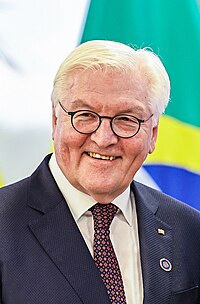Oberjarl of Tevitheim: Difference between revisions
No edit summary |
No edit summary |
||
| Line 34: | Line 34: | ||
The '''Oberjarl of Tevitheim''', officially titled the '''Oberjarl of the United Jarldoms''' ({{wp|Norwegian language|Tronder}}: ''Oberjarls Forente Jarldømer'') is the {{wp|head of state}} of [[Tevitheim]]. | The '''Oberjarl of Tevitheim''', officially titled the '''Oberjarl of the United Jarldoms''' ({{wp|Norwegian language|Tronder}}: ''Oberjarls Forente Jarldømer'') is the {{wp|head of state}} of [[Tevitheim]]. | ||
While officially the chief executive of Tevitheim, political convention and social tradition have resulted in a ''de facto'' {{wp|Parliamentary Republic|parliamentary}} system in which the [[Hilfmann of Tevitheim|hilfmann]] (similar to a prime minister in other parliamentary systems) is the head of government. The oberjarl thus has a ceremonial role as a figurehead, but also has some reserved political powers. They can use their unofficial influence and right-of-address in both houses of the [[Nasjonalforsamling]] to influence and direct political debate. They may also grant pardons on behalf of the federal government, represent Tevitheim in matters of international law, conclude treaties with foreign states on its behalf, accredit diplomats, and dissolve the Nasjonalforsamling and force new elections. Furthermore, all federal laws must be signed by the oberjarl before they can come into effect; oberjarls may veto a law if they believe it to violate the constitution. | |||
In the role of head of state, the oberjarl's actions and public appearances represent the state itself, its existence, legitimacy, and unity. The oberjarl enjoys a higher ranking at official functions than the hilfmann. The oberjarl's role is integrative and includes the control function of upholding the law and the constitution. It is a matter of political tradition – not legal restrictions – that the oberjarl generally does not comment routinely on issues in the news, particularly when there is some controversy among the political parties. This distance from day-to-day politics and daily governmental issues allows the oberjarl to be a source of clarification, to influence public debate, voice criticism, offer suggestions, and make proposals. In order to exercise this power, they traditionally act above party politics. | |||
The current officeholder is [[Roald Vead]], former jarl of [[New Hammerfest]], who was elected on 19 July 2015. He is currently serving his first nine-year-term, which will expire after the [[2024 Tevitheimer Oberjarl Election|next election]] on 21 July 2024. | |||
Revision as of 01:57, 8 July 2024
| Oberjarl of the United Jarldoms | |
|---|---|
| Oberjarls Forente Jarldømer | |
 Oberjarl Coat of Arms | |
 Standard of the Oberjarl | |
| Style | Herr Oberjarl (male) Fru Oberjarl (female) |
| Type | Head of State |
| Appointer | Jarls of Tevitheim |
| Term length | 9 years, renewable |
| Constituting instrument | Constitution of Los Angeles |
| Formation | 11 July 1959 |
| First holder | Paal Sellens |
| Succession | President of the Jarlaråd |
| Salary | ᵹ2,500,000 |
The Oberjarl of Tevitheim, officially titled the Oberjarl of the United Jarldoms (Tronder: Oberjarls Forente Jarldømer) is the head of state of Tevitheim.
While officially the chief executive of Tevitheim, political convention and social tradition have resulted in a de facto parliamentary system in which the hilfmann (similar to a prime minister in other parliamentary systems) is the head of government. The oberjarl thus has a ceremonial role as a figurehead, but also has some reserved political powers. They can use their unofficial influence and right-of-address in both houses of the Nasjonalforsamling to influence and direct political debate. They may also grant pardons on behalf of the federal government, represent Tevitheim in matters of international law, conclude treaties with foreign states on its behalf, accredit diplomats, and dissolve the Nasjonalforsamling and force new elections. Furthermore, all federal laws must be signed by the oberjarl before they can come into effect; oberjarls may veto a law if they believe it to violate the constitution.
In the role of head of state, the oberjarl's actions and public appearances represent the state itself, its existence, legitimacy, and unity. The oberjarl enjoys a higher ranking at official functions than the hilfmann. The oberjarl's role is integrative and includes the control function of upholding the law and the constitution. It is a matter of political tradition – not legal restrictions – that the oberjarl generally does not comment routinely on issues in the news, particularly when there is some controversy among the political parties. This distance from day-to-day politics and daily governmental issues allows the oberjarl to be a source of clarification, to influence public debate, voice criticism, offer suggestions, and make proposals. In order to exercise this power, they traditionally act above party politics.
The current officeholder is Roald Vead, former jarl of New Hammerfest, who was elected on 19 July 2015. He is currently serving his first nine-year-term, which will expire after the next election on 21 July 2024.
